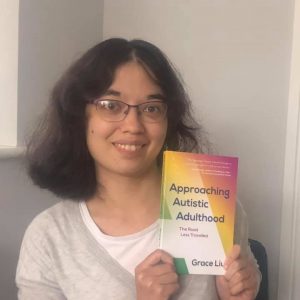Grace Liu is a biracial, autistic, lesbian writer, artist, public speaker, and podcast host from the UK. She writes and speaks about Autism, LGBT issues, intersectionality and diversity, writing, and family issues.
This week she shared some of her experiences as a mixed-race Autistic lesbian.
How was your autism diagnosis explained to you? Positively, negatively, neutrally?
I can’t remember off the top of my head, but I think my mum and stepdad just explained I’m made a little bit differently and may need extra help with some things.
What unique struggles or celebrations have you experienced as a mixed-race Autistic person?
(I’m also a lesbian, so will include that as well.) My mum thinks part of the reason I didn’t get diagnosed sooner was due to racial bias (as well as my teachers looking down on her for being an unemployed single mother at the time). Later, at secondary school, boys would combine catcalling with racial harassment (eg slurs). Because I was autistic, I was more vulnerable to teasing and bullying, race related or not. To this day, I get self-conscious when well-meaning strangers say something about my race out of the blue (“Where are you from?” “Ni hao” “do you speak English,” etc). Not because it’s a secret, but because being singled out for being different is something I have had to deal with all my life.
I was also raised a Christian (though my parents are no longer Christians) and as a teenager, I became more involved in Christian activities. Kids at church were less judgmental about me being autistic than kids at school, and it was at this time I felt more able to open up about it. However, I was trying to fight the realisation that I was gay, and I soon became aware that many Christians were homophobic, which caused a lot of internal turmoil. I was so desperate to be accepted that I thought suppressing my sexuality and keeping it a secret was the best thing to do.
Can you think of anything people do that they think is inclusive, but, in fact, is not very inclusive, or falls short in some way?
People don’t realise that there is more to being inclusive than simply letting an autistic (or otherwise marginalised) person into their space. Explicit hostility towards autistic people isn’t nearly as common as people who seem to accept an autistic person but not tolerate communication differences, lack of eye contact, different interests/needs etc. People need to listen to what autistic people are saying about their needs and not pressure them to keep going with something that is overwhelming for them. I also find it frustrating when I’m struggling and people say “you don’t need to do/feel [insert behaviour/emotion]” as if I’m choosing to do it for a certain outcome when it’s just how I’m handling the situation and don’t have the capacity to act neurotypical.
I find it frustrating when people make assumptions about autistic people, even when they mean well e.g. “You must be great with computers!” Or when they patronise us or make assumptions about our abilities. People sometimes see us as stupid, incompetent, childlike, etc. when we struggle, or appear autistic. Or they see us passing as neurotypical and assume we don’t have additional struggles. I also find it hard to hear how autism is still seen as a lesser way of being and something shameful to be removed or separated from the person. I really wish non-autistic people would listen to what autistic people say about autism and amplify what we are saying instead of talking over us.
I appreciated what you’ve written recently about the double empathy theory. Instead of assuming that communication problems always lie with the Autistic person, do you have advice for mixed neurotype couples, families, friendships, or other relationships who are trying to improve communication?
Be clear and literal in your communication – no unspoken expectations. Remember that the problem isn’t solely due to autism but due to the language barrier between autistic and non-autistic people. Be both honest and respectful (this is something I think ALL people need to remember).
Tell me about your book Approaching Autistic Adulthood: The Road Less Travelled. Who is the audience? What do you hope readers gain or why did you write it?
The book is for autistic adults getting to grips with adult life. I want autistic readers to know they are not alone and I want non-autistic readers to understand autistic people better and promote autistic-led resources.
What are some of your favorite topics to formally speak about?
Autism, intersectionality, LGBT issues. For more information, go to the speaking section of my website (Public Speaking – Artistic Autistic Grace (artistic-autistic.co.uk)). FYI my Autism Oxford talk has been cancelled.
Connect with Grace
Facebook: Unwritten Grace – autism and writing
Twitter: Grace Liu @unwrittengracel
Instagram: Grace Liu @unwrittengraceblogs
LinkedIn: Grace Liu

